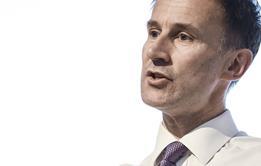In an exclusive interview Jeremy Hunt makes it clear he will challenge the NHS to improve, but he also needs to give it hope, says HSJ editor Alastair McLellan
An astonishing thing happened at least week’s HSJ Awards, Jeremy Hunt addressed the 1,800 celebrating NHS staff and called a group of them “bastards”.

‘Jeremy Hunt feels no need to treat the service with kid gloves’
The episode tells us two things about the health secretary: the first is that he is a consummate communicator. His tongue-in-cheek reproach about being made to clean bedpans on a visit to Harrogate received laughs and applause aplenty. The second is that Mr Hunt feels no need to treat the service with kid gloves.
In his most revealing interview to date, the health secretary makes a number of significant declarations on, for example, the role of choice, commissioning and his own ambitions. However, the overarching theme was national leadership of the service.
Mr Hunt has spoken in the past about being the public’s champion, but in this interview he goes further, saying: “I think it has been a profound mistake for people at the top of the NHS – whether politicians or civil servants or NHS leaders” to act as cheerleaders for the service.
He continued: “The chief executive of Marks & Spencer is not a cheerleader for staff that work in M&S. [He’s there] to lead that company into the best possible place by doing a fantastic job for customers and looking after staff extremely well. And the most motivating thing for staff is to know that you’re doing a great job for the people you’re there to look after.”
Setting himself apart
Mr Hunt acknowledges the need to be “encouraging” as well as “challenging”, but he wants clear blue water to appear between himself and his shadow Andy Burnham, who the health secretary would like to paint on the “side” of vested interests within the NHS.
‘Mr Hunt is well aware of the perceived need for national leaders to be more active in fighting the service’s corner’
He criticised the last government for getting “themselves into a mentality of saying that because there are 1.3m people who work in the NHS, no criticism of the NHS should ever pass a minister’s lips”, adding “the truth is people working in the NHS know where problems are. It’s not leadership to try and sweep those problems under the carpet”.
Reflecting on his own experience, he said: “Nobody thought a health secretary who stood up and talked about cruelty in the NHS would last very long, but… that was the right thing to do.”
Mr Hunt is well aware of the perceived need for national leaders to be more active in fighting the service’s corner as the finances and performance margins tighten.
It was a criticism levelled at the chief executives of the Care Quality Commission, Monitor and the NHS Trust Development Authority when Messrs Behan, Bennett and Flory appeared together at the Foundation Trust Network conference last week.
Leaders vs cheerleaders
The only note of caution about Simon Steven’s leadership of NHS England appears to be his steadfast refusal to empathise with the pain being felt by the service – something that his predecessor as chief executive Sir David Nicholson, for all his iron fist reputation, was only too happy to do on occasion.
‘Any good leader knows that his or her primary duty is to instil hope – to set out a future that is worth fighting for’
Does this lack of cheerleading matter? In one sense, Mr Hunt is right there should be no beholden duty on national leaders to sing the praises of the NHS simply because it will make staff feel better.
However, any good leader knows that his or her primary duty is to instil hope – to set out a future that is worth fighting for and give those striving to reach it the confidence they need to succeed.
Mr Hunt believes the “very coherent, very powerful” NHS Five Year Forward View has provided that vision – and there is no doubt it has excited the imagination of many. But throughout much of the service hope is thin on the ground. The health secretary’s robust approach is a high risk strategy to turn that situation around.
Exclusive: Patient choice is not key to improving performance, says Hunt

Patient choice is no longer fundamental to improving NHS performance, the health secretary has told HSJ
- 1
- 2
- 3
 Currently
reading
Currently
reading
Hunt takes a high risk approach to restoring hope to the service


































4 Readers' comments